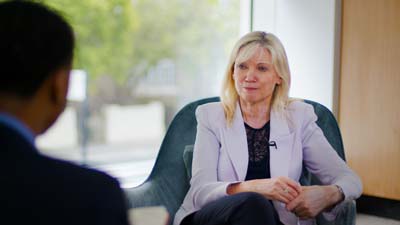Ollie Smith: We've been on stage today at Morningstar Investment Conference UK 2022, and I've been asking my panelists about the future of financial advice. Joining me is a real-life financial advisor and a real-life TikToker, Alex Stedman.
Alex, can you talk to me a little bit about crossing through the noise on social media and specifically, TikTok?
Alex Stedman: Yeah. So, online there is noise which could be classified as both, good noise and bad noise, basically. You can have plenty of people making videos, giving bad advice, bad guidance, telling you to put all of your money into this particular stock, only for the dividends or something like that. And there can be some perfectly good advice as well on there, but it might not just be engaging enough in order to get the viewer in there.
So, I suppose a couple of examples of this would be where I wanted to demonstrate the idea of compound growth, and I phrased it in the way of looking at it from a child's pension, a child's SIP that you can set up, a junior SIP, and you can put in £2,880 a year before the government top up. And if you were to take that for the first 10 years of the child's life and invest it in just a standard index fund that's got the historical average of about 7% a year, then by the time that child grows up to retire, that would be worth well over £1 million. And that was picked up by a number of websites and even a national newspaper as well. So, I think that that one managed to cut through basically because it showed how to become wealthy, and people want to know how to basically invest and make money.
Another one that I did was talking about pensions versus lifetime ISAs. So, a question was posed me – which one is better? And I'd seen people go onto a whiteboard and demonstrate the difference and write down all of the formula and the tax relief and everything. But I approached it in the way of how much it would actually cost. So, what is the difference on the bottom line of your paycheck? What's the difference going to be there? And that seemed to really relate with people as well. And so, that seemed to cut through, and I even had a few comments of people saying that they're going to take a second look at their pensions and start setting things up because of that, which of course made me very happy.
OS: Yeah, sure. And just in terms of what you were saying on stage about competence, the financial competence, you described yourself as an optimist. And given the amount of noise, good and bad online, why is it that you think that financial competence is, generally speaking, rising rather than falling?
AS: I think that there has been a lot more awareness around it over the last decade. I do think that someone like Martin Lewis at MoneySavingExpert has had quite a huge influence on people as well. He is not just talking about money saving anymore; he is doing a lot about money education. He has campaigned to put financial education in schools. And so, now, we're seeing that being taught albeit wrapped up in math lessons, it is still going in there. And just the ability to go onto your phone and have the entire world of knowledge at your fingertips as well. People are also clued in – I'm seeing a lot of the younger generation ask some very intelligent questions. They're wondering about the economy. They're wondering about inflation at a far younger age than I ever knew about it. And they're asking those questions, and they're finding the answers to them online. And when you wrap all of that up together, I do generally see a rise in financial knowledge, and with that comes financial competence.
OS: That's a compelling case. I think, I believe you. For more on investment content and indeed, the results of our content at Morningstar Investment Conference UK 2022 today, check out Morningstar.co.uk. Until next time, I've been Ollie Smith for Morningstar.



























